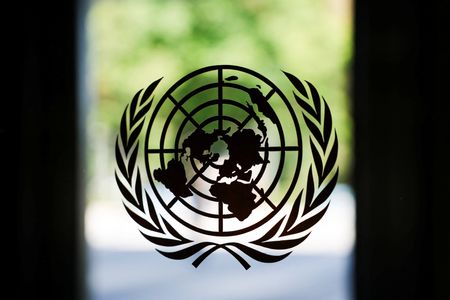By Simon Jessop, Katy Daigle and Kate Abnett
(Reuters) – When Climate Week kicks off on Sunday in New York City, it will mark the event’s biggest year yet – with organizers reporting a record number of companies participating and more events than ever to attend.
Almost no one had expected this response in a year that has seen the event’s host country – and the world’s wealthiest – set to a climate-denying agenda of boosting fossil fuels, rolling back pollution regulation and defunding U.S. science and climate action.
Organizers of Climate Week even wondered, “Would people show up?” said Climate Group Chief Executive Officer Helen Clarkson.
“Actually, there’s huge enthusiasm for it,” Clarkson said.
Held alongside the U.N. General Assembly since 2009, this year’s Climate Week showcases more than 1,000 events – including presentations, panel discussions and swanky cocktail parties – hosted by environmental nonprofits, companies and philanthropists hoping to generate deals and discussion around protecting the planet.
Last year’s Climate Week, by comparison, saw about 900 events.
The boost in engagement has come “precisely as an antidote to the current U.S. administration’s attitude toward climate change,” former U.N. climate chief Christiana Figueres told Reuters in an interview.
Ten years ago, Figueres helped to craft the 2015 Paris Treaty under which countries agreed to hold the global temperatures to within 2 degrees Celsius of the preindustrial average while aiming for a more ambitious target of 1.5 degrees Celsius.
But while national governments were pushing the climate agenda 10 years ago, Figueres said, the situation has since drastically changed.
“The pull now is coming from stakeholders, from the real economy, from market forces that are pulling forward,” Figueres said.
The Swiss carbon capture firm Climeworks has booked itself for nearly four times the number of events this year compared with last year, after the company in February raised $162 million toward improving its technology and growing the company, Co-Chief Executive Christoph Gebald said.
“We’re continuing to see demand increase for carbon removals,” Gebald said. For Climate Week, “the level of interest from the most senior levels of companies is higher than ever.”
Many major fossil fuel companies and some oil-dependent governments, however, have made moves toward reversing previous climate commitments.
A DIFFERENT WORLD
With the U.N. General Assembly meeting at the same time, Climate Week has developed into a major networking opportunity for CEOs and investors to rub elbows with visiting world leaders.
The Assembly will take up the climate change issue on Wednesday, when Secretary-General Antonio Guterrez hosts a special “climate summit.” Many leaders are expected to announce new climate targets, or Nationally Determined Contributions.
Neither the U.S. nor the European Union will be among them, despite having acted as leaders of the global climate agenda in the past. Instead, China, COP30 host Brazil and other fast-developing nations have taken a more active role in setting the agenda.
China’s emissions-reduction plan could also be announced any day but may underwhelm on ambition, climate sources said.
Meanwhile, the European Union is still struggling to reach agreement about how ambitious those targets should be – raising tensions about whether Brazil’s COP30 summit starting in only seven weeks will succeed.
“Historically, Europe has been in the front, both when it comes to taking ambitious targets … also on the financial side of the international agreements,” Danish climate minister Lars Aagaard said. But “Europe’s role in the world has changed. We are 6% of global emissions. So therefore, there is also a call from our side that all parties to the Paris Agreement also should lift their responsibility.”
The region is nevertheless seeing fast progress in its energy transition, with the EU projecting a 54% reduction in its greenhouse gas emissions by 2030 from 1990 levels – meaning member countries are nearly on track for the EU’s previous 55% target for 2030.
With leaders at November’s COP30 set to focus on boosting implementation of promises made in the past, experts say companies need to be in the conversation now.
More than half of the world’s biggest companies have pledged to reach net-zero emissions by mid-century, in line with the world’s climate goal, according to data from the non-profit Net-Zero Tracker.
But according to an analysis by the TPI Global Climate Transition Centre at the London School of Economics and Political Science, a whopping 98% of companies have shared no plans for aligning their spending with those commitments.
“The challenge for New York Climate Week and beyond is to ensure that individuals and institutions come together in new ways to reimagine how we can cooperate against common threats,” said Rajiv Shah, president of The Rockefeller Foundation.
A survey released on Thursday by the foundation that questioned 36,348 people worldwide estimated that most of the world’s population – a full 86% – believed international cooperation was crucial for climate action.
(Reporting by Simon Jessop in London, Katy Daigle in Washington, D.C., and Kate Abnett in Brussels; Additional reporting by Axel Threlfall in London; Editing by Mark Porter)











